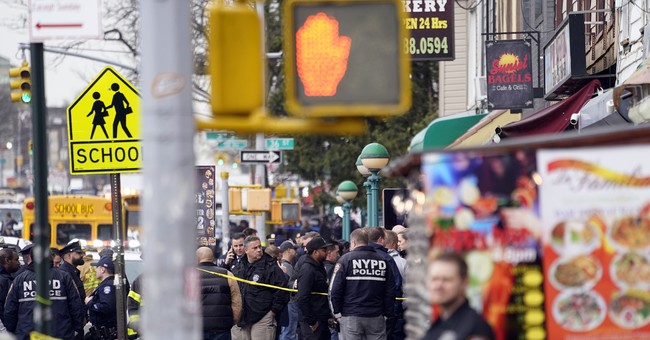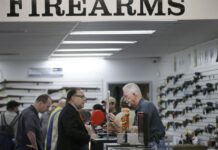Crime, and the fear Americans have of it, has proven to be a popular talking point for election cycles and the 2022 midterm elections were no different. It played a big role in New York, California, Illinois and more, as some Republican candidates claimed the state’s major cities were riddled with crime and headlines of violence fanned the flames, resulting in crime being one of the top concerns for U.S. voters ahead of the election, some major polling showed. (Exit polls showed inflation and abortion access were also top of mind.) However, surveys show Americans are continuously bad at perceiving just how much crime is actually happening. The Pew Research Center found that 61% of voters say violent crime was a key issue of importance when voting in this year’s congressional elections, despite reports from the Bureau of Justice Statistics that show no significant increase in the U.S. violent crime rate. The crime rate — for both violent/property and overall offenses — has been at a steady decline since the crime peak of the 1990s, and remains much lower than that.
That’s a half-truth at best. There hasn’t been a significant increase in the U.S. crime rate between 2021 and 2022. The significant increase came between 2019 and 2020, when violent crime exploded in many U.S. cities. Since then the crime stats have stayed largely flat, but that means that many categories are still significantly higher than they were just a few years ago, which ABC half-heartedly acknowledges when it starts delving into crime states in New York, Chicago, and Los Angeles.So far in 2022, shootings, murders and aggravated battery are down from this time last year, according to Chicago Police crime statistics. Robbery, burglary, theft and motor vehicle theft are up. When calculating the year-to-date percent change, there is a 40% rise in major crimes from last year, and a 16% change from 2018. In 2021, there were 84,316 crimes overall, which is down from 152,031 in 2010. It’s also down from 199,234 in 2001. Comparatively, it’s way down from the 1990s, when it reached a peak of 323,944 incidents in 1991.
Crime is not as bad as it was 30 years ago, even in Chicago, which is great (and also proves that the “more guns equals more crime” theory is a great big lie). But it’s absurd to dismiss the concerns of voters when there’s been a 40% increase in major crime categories over the past year. In all three cities there were at least some categories of violent crimes that have increased over last year, and more importantly, all three cities have seen much larger increases going back to 2020. Still, ABC News really tries to make the case that voters concerns about crime were nothing more than Republican fearmongering.Targeting voters through fear – whether it be crime or any other cause – can have a big impact on what voters focus on and how they vote, even if it’s not exactly representative of what’s happening, experts say. “One implication of [Americans’ poor perception of crime] is the extent to which politicians and elites can prime voters to think about crime … and activate those fears, those perceptions, that can lead to some political benefit,” said Andrew Reeves, professor at Washington University in St. Louis. For example, New York Republican gubernatorial candidate Lee Zeldin’s focus on crime is believed to have helped lead him to an unexpectedly close race for the governor’s office, according to experts. “There is rising crime on our streets and in our subways, and people who are in charge right now in Albany actually feel like they haven’t passed enough pro-criminal laws,” New York Republican gubernatorial candidate Lee Zeldin said in a press conference. Research has found that people often feel a sense of attachment toward their own community and value them as better and safer, while misinterpreting the security in other neighborhoods. Experts who spoke to ABC News cited both politics and the gory headlines seen in media as to why this perception of crime may be skewed.
Again, who’s perception is skewed? You know why a lot of New Yorkers feel less safe than they did a year ago? Because they’re less safe than they were a year ago. Murders and shootings have declined slightly in New York City compared to last year, but rapes and robberies have increased, and outside of New York City other cities like Rochester have seen record high homicide rates over the past couple of years. You can find similar troubling statistics all around the country. In Memphis, there was a 42% increase in juvenile crime between 2021 and this year. Milwaukee will set a new and grim record for the number of murders, and Philadelphia is likely to do the same. If this is fearmongering, then what would ABC News call its own report from just one year ago that documented the record number of homicides in twelve major cities?Of the dozen cities that have already surpassed the grim milestones for killings, five topped records that were set or tied just last year. “It’s terrible to every morning get up and have to go look at the numbers and then look at the news and see the stories. It’s just crazy. It’s just crazy and this needs to stop,” Philadelphia Mayor Jim Kenney said after his city surpassed its annual homicide record of 500, which stood since 1990. Philadelphia, a city of roughly 1.5 million people, has had more homicides this year (521 as of Dec. 6) than the nation’s two largest cities, New York (443 as of Dec. 5) and Los Angeles (352 as of Nov. 27). That’s an increase of 13% from 2020, a year that nearly broke the 1990 record.
In its most recent report ABC News didn’t mention Philadelphia or the 461 homicide victims so far this year, even though that’s actually a 6% improvement. Nor did they update their audience on Portland, which had a record-high 90 murders in 2021 and has had 84 so far this year. In fact, none of the twelve cities that ABC News reported on last year were included in their recent story downplaying concerns about crime. Some cities, like Austin, Texas, appear to be on pace for a slightly better year, but others, including Albuquerque, are set to once again see last year’s record broken. I’d be more than happy to see our crime rates once again start declining, as they did between 1991 and 2020; a time, incidentally, when tens of millions of firearms were sold and millions of Americans began exercising their right to carry. It’s simply not the case that 2020’s crime spike has subsided in any meaningful way. You have good reason to be increasingly concerned about your personal safety, even if Democrats and their media allies would love to convince you otherwise.



